“For film critic and historian Joe Leydon, the cross-pollination of Hollywood and YouTube is only natural. He calls the clips on YouTube “the cinematic equivalent of garage band recordings…just as there will be elements of garage bands that will be incorporated into mainstream music, there will also be garage bands signed to recording contracts with major labels,” says Leydon. “I’m sure that some of the people who will be releasing summer comedies in 2008 are making little comedy shorts for display right now on YouTube.” — from Dave Roos‘ “The Jackass Generation,”in issue # 67 of MovieMaker magazine.
wired
“Straight Time” on DVD
Another great ’70s crime movie is coming on Warner Home Video DVD, and on the very same day (May 22nd) as the release of WHV’s Prince of the City two-disc set — Ulu Grosbard‘s Straight Time (1978), in which Dustin Hoffman gives one of his most bitingly real performances.
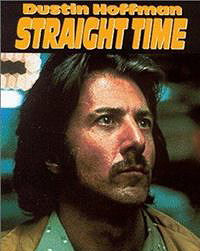
He plays a hard-core felon, Max Dembo, just released from a six-year stretch in the slam, whose difficulties with a goading, mind-fucking parole officer (M. Emmet Walsh) and his fraternizing with two ex-con pals (Harry M. Stanton, Gary Busey) eventually nudge him back to a life of crime. Theresa Russell is first-rate as the average, solemn-faced girl whom Dembo hooks up with.
The taut, hard-edged screenplay was by Jeffrey Boam, Alvin Sargent and Eddie Bunker, based on Bunker’s novel No Beast So Fierce. I’m reading that Michael Mann also contributed to the screenplay but was uncredited upon the film’s release. No Beast So Fierce allegedly served as a source of reference for Robert De Niro‘s Neil McCauley character in Mann’s Heat.
Smith’s Longish Title
Kevin Smith has announced that “we’ve finally secured funding for the sixth film in the Jersey Trilogy, tentatively titled ‘Derogatory Term For Slacker Twentysomethings: Funny Word After Colon.’
“We’re currently tinkering with the tag line — I suggested ‘just because they do something doesn’t mean they have to do something,’ but corporate’s pushing for ‘punchy, two-sentence sarcastic comment…balls.’ After fighting all this time just for permission to do the project I’m inclined to let them win the battle, but we’ll see what the future brings.”
I personally prefer the generic title. I wouldn’t hesitate to pay to see a movie called Derogatory Term For Slacker Twentysomethings: Funny Word After Colon. I wouldn’t care about reviews…i would just go.
Lemon Coke
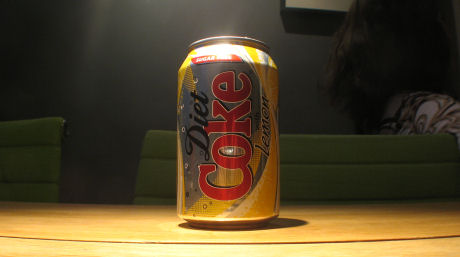
Taken off U.S. shelves but (thank God) available in England and Europe, and (no lie) one of the best-lighted shots I’ve ever taken with the Canon Power Shot 540 — Saturday, 3.10.07, 6:52 pm
I’ve heard from a Canadian source that Zack Snyder‘s 300 may have made as much as $29 million yesterday. That obviously means a weekend total that could be as high as $65 million or even $70 million. This is obviously much, much higher than anyone expected. (The last estimate I heard was roughly $40 million.) Wild Hogs came in second with $8 million, the guy says.
“Sopranos” praise
I don’t hold with Tom Tapp‘s putdown of Peter Biskind‘s “The Story of The Sopranos” piece in the new Vanity Fair. Sometimes words of praise are entirely just and fitting. I worship this show — it can’t be spoken of too highly — and everything Biskind says about it is spot-on. My words exactly.
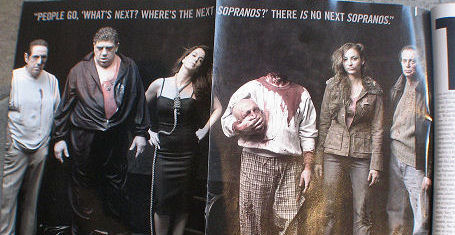
Sopranos departed (l. to r.): David Proval, Vincent Pastore, Annabella Sciorra, Joe Pantoliano, Drea de Matteo, Steve Buscemi
I particularly agree with his flat declaration that The Sopranos “is one of the masterpieces of American popular culture, on par with the first two Godfathers, Mean Streets and Goodfellas [as well as] Fellini’s 8 1/2, Visconti’s The Leopardand Fassbinder’s Berlin Alexanderplatz.” The Sopranos saga has been unfolding since early ’99 — hard to believe it’s been eight years. My heart is breaking that it’s all coming to an end.
My nostalgia is so pervasive I’m willing to forgive and forget that season #4 felt like a bit of a wank. Wait…do I mean #3? It was one of those two.
Here’s a video record of he Annie Liebowitz cover shoot.
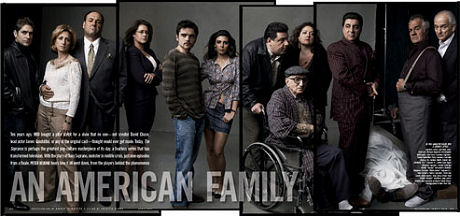
London pics #1

Unable to sleep — Saturday, 3.10.07, 6:45 am; typical pub action — Friday, 3.9.07, 7:55 pm; Regent Street window display; Elgin near Portobello; outside Hammersmith station; late-afternoon nothingness
“Trek” screenwriters
MTV.com’s Josh Horowitz sat down with Alex Kurtzman and Roberto Orci, the writers of the forthcoming Jason Abrams-directed Star Trek feature, and sifted through the general emptiness of their project. The fact that Trekkies — a fanboy sub-culture that stretches back nearly 40 years, for heaven’s sake — are still hanging in there and supposedly revved up about this new Trek pic is something that’s gone beyond the realm of a cultural curiosity/embarassment. The thought of tens of thousands of people out there who are still into memories of Kirk, Spock, Scottie, Bones Chekhov, Uhura….the mind reels.
Zodiac Avery
The Zodiac-inspired “I Am Not Avery” series…T-shirts, buttons, bumper stickers, etc. I’ve never worn a promotional T-shirt in my life, but I’d almost consider wearing one of these.

Okun Replies re Teardrop
Blood Diamond visual effects supervisor Jeffrey A. Okun has written to say that he “[takes] take great issue with the impressions and facts of your article on the Jennifer Connelly teardrop [in Blood Diamond].” Fine, except all I did was quote from and attempt to summarize a two-week-old Times Online piece by Ben Hoyle.
The thrust of Okun’s letter seems to be that Connelly’s teardrop on her cheek was digitally manipulated (i.e., copied or substituted), but in an emotionally genuine way because she really did “cry” while performing the scene…just not in the precise way we see her crying in the scene in question.
“Your article implies that the tear was added in an arrogant and off-handed manner with complete disregard for Jennifer and her performance. In fact, she did cry in the scene — but maybe not in this part of this take.
“Ben Hoyle, you will notice, did not say that we added the tear but that there was a take without it and a digitally manipulated ‘after’ shot with it. For all any of you know, we took the crying Jennifer from one take and used it in the other. Further, you should note that I, the visual effects supervisor, did not say anything about if we did add a tear or not. I spoke only to costs of altering performances and how I feel about it when I am asked if we can do it.
“Your story leads the reader to believe that we did in fact add a tear with wanton disregard for the actress or her performance.
“I would greatly appreciate it if you would please either print a retraction, remove the incorrect impressions or take the story down immediately.” — Most sincerely, Jeffrey A. Olkun, Visual Effects Supervisor, Blood Diamond.
Wells to Okun: “Thanks for writing and voicing your view. I’ll run your letter (you already ran it in the comments section), but I certainly won’t take down the story. All I did was quote from and summarize a story that ran in the Times Online — I didn’t write/report anything myself.
“It seems to me, however, that you’re splitting hairs by saying you may have copied a Jennifer tear and pasted it into another scene, etc. The bottom line, in my view, is that the CG guys — having dazzled but at the same ruined any sense of audience trust or belief in visual realism since virtually every scene in movies these days involving any kind of scale or eye-filling wonder is a manifestation of some form of CG bullshit (nothing is real, it’s all high-tech hard-drive fakery, a CG cartoon-like world through and through) — are now moving into another realm.
“I’m speaking of the world of emotional reality that actors strive so hard to deliver with focus and authenticity. You may be faking it a somewhat ‘real’ way in Jennifer Connelly’s case because she really did ‘cry’ at one point while filming the scene in question, but you and I know it’s the thin end of the wedge. The next guy is going to fake the next performance just a little bit more, and then the next guy and the next guy, etc.
“Tell me I’m wrong. Tell me Werner Herzog is wrong. No offense, but some of us feel that excessive CG is the worst thing to happen to the magic of movies in a long , long time, and this latest manifestation — copied/duplicated/substituted teardrops — is just the beginning of another wave of digital bullshit that will further separate moviegoers from a semblance of real-world reallity as they watch films in hopes of deriving a sense of whatever…art, meaning, real-life echoes.”
English obstructions
Friday was one of those days in which circumstance, travel fatigue and profound technological mysteries conspired to block me from filing for too many jet-lagged hours. It’s 9:40 pm London time, I got maybe two and a half hours of shut-eye on the plane last night, I chugged three cans of Red Bull for dinner this evening and I don’t even have the energy to plotz. I’m not explaining/complaining …well, I am. But if you’d been through today’s ordeal…
Love and kisses to the people at Heathrow who sell cell-phone SIM cards at more than double the market value. Hearts and flowers to the geniuses at Radio Shack U.S.A. for selling an expensive computer power cord that doesn’t carry English current. And my sincere thanks to the wonderful guys at T-Mobile U.K. tech sup- port for prolonging the solve time regarding password issues for wi-fi connection at Starbucks. England felt to me like a Third World country today, technologically- speaking — a nightmarish time-capsule revisiting to the bad old computer days of the mid ’90s.
Rock & Rohmer
Chris Rock‘s I Think I Love My Wife (Fox Searchlight, 3.16) isn’t over-the-moon great, but it isn’t half bad. The one-sheet tells you it’s a generic marital infidelity comedy and it certainly has the lightness of tone that goes with the form, but it also has some mildly surprising grace notes and side-intrigues that you don’t usually get with this sort of thing.
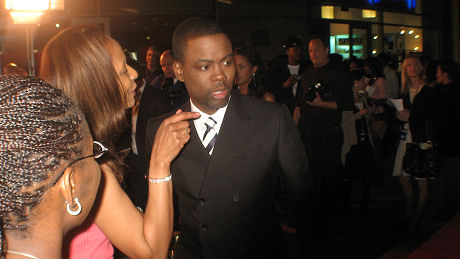
I could write a 1500-word piece, easy, about the indications in Chris Rock’s expression and body posture in this shot, which was taken last night outside the Arclight, prior to the premiere screening of Rock’s I Think I Love My Wife — Wednesday, 3.7.07, 7:25 pm
One of the interesting side notes is that the film seems to be saying that wealthy, upscale African-Americans are living lives in their toney suburban homes that are just as bland and conservative and spiritually enervated as the regimented, martini-supplanted lives that suburban white-breads have been accused of living for decades, going back to the days of John Cheever‘s “Bullet Park” and Sloan Wilson‘s “The Man in the Grey Flannel Suit.”
I Think I Love My Wife is about a well-employed commuter husband (Rock) who’s bored and frustrated because his wife (Gina Torres) is never in the mood, so he starts sniffing around (and I mean just that — sniffing, not tom-catting) and pretty soon into the film a very sexy lady he used to know in his youth (Kerry Washington) is visiting him at the office and showing all kinds of interest, etc. The light is green, the door is open — all he has to do is walk through.
But Rock (who directed and co-wrote) is not exactly a fire-in-the-loins type, and so nothing really happens in the way of libidinal incrimination. But oh, boy…does it almost!
The “almost” and “nothing really happens” aspects are actually what make Rock’s film feel agreeably different. Obviously Rock made it in order to share some personal impressions of married life and his deep-down feelings about catting around, but the moderate, meditative tone (and perhaps the lack of overt crassness — there’s only one dick joke in the entire thing) is probably due to some extent to the surprising fact that it’s based on Eric Rohmer‘s Chloe in the Afternoon (1972).
Yes, that’s what I’m saying — I Think I Love My Wife is essentially Eric Rohmer channelled through Chris Rock. (The Chloe acknowledgment is right there in the opening credits.)
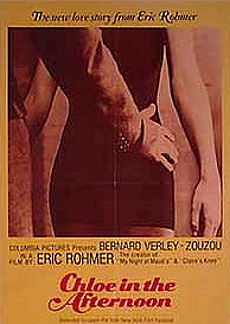
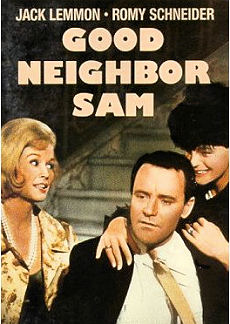
The Rock and Rohmer films are different in numerous ways, of course. Maye dozens of ways. The Rohmer is…well, Rohmer resplendent. Chloe is one of his “Six Moral Tales,” and this one , at least, is about much more than watching paint dry. Rock’s film, however, is basically about resignation, subjugation, regimentation. Nothing that wild or perverse happens, but the restraint that he shows — the Rohmer-esque mood and attitude that he tries to re-express — is at the very least distinctive and intriguingly un-American (i.e., faux-French).
Okay, there’s one half-perverse moment when Steve Buscemi, as Rock’s co-worker who constantly cheats on his wife, says, “I may not look like Brad Pitt, but I can fuck like him.”
Rock’s film is actually a hybrd of itself, the Rohmer film and David Swift‘s Good Neighbor Sam ()1964, a Jack Lemmon comedy about a married advertising guy (Dorothy Provine plays his wife) with dreams of having an affair with a visiting French lady (Romy Schneider). It’s funny (or not so funny) how the sexual frustrations of Lemmon’s character and the general idyllic/antiseptic vibe of the home and neighborhood in which he and his life live are almost exactly the same as the ones in Rock’s film.
If you want a positive slant, Rock’s film is about being happy with the good serene stuff you have in your life rather than bitching about the exciting, hot-blooded stuff you’re missing.
